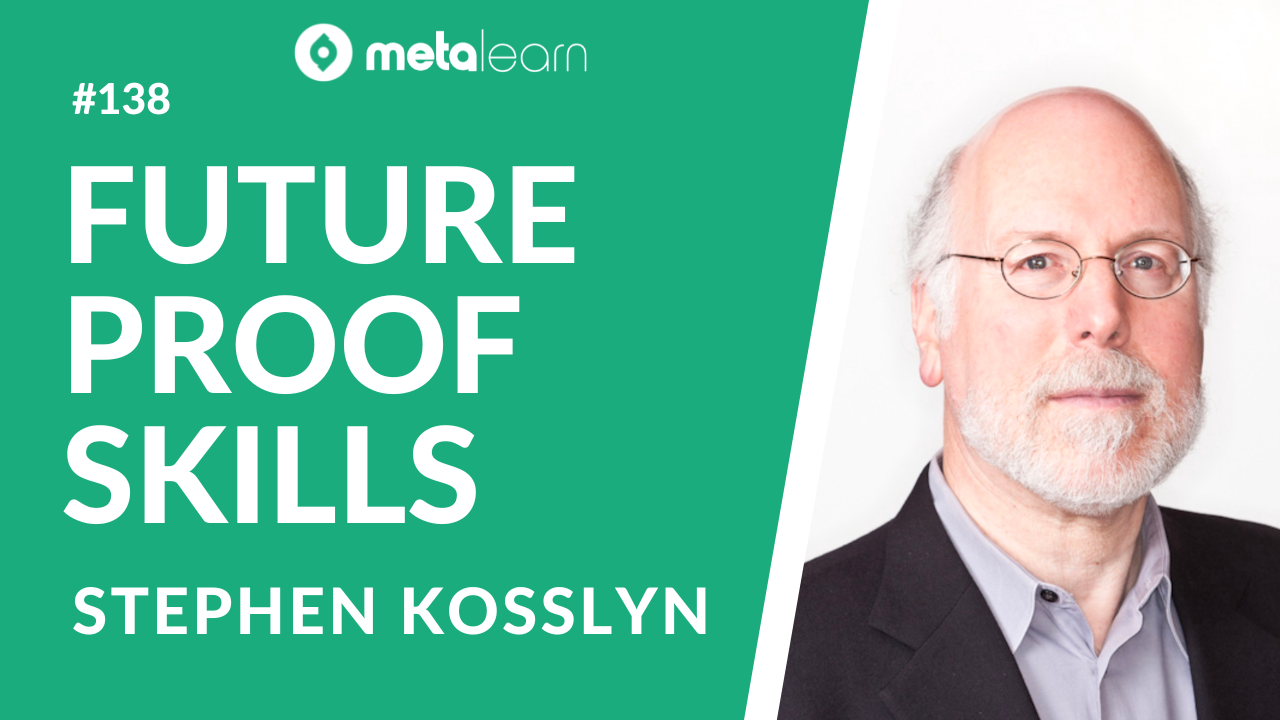ML138: Stephen Kosslyn on Futureproof Education for Adults, Using Hacks and Heuristics and the Lifelong Learning Imperative
Discover the implications of the coronavirus for online learning, why Foundry College chose the future proof skills they teach when forming their curriculum and how you should be learning throughout your adult life.

Stephen Kosslyn is the President and CEO of Foundry College and one of the world’s most respected cognitive scientists. He has four decades of research and teaching experience at elite institutions like Stanford and Harvard, where he was also Dean of Social Sciences.
When I last had Stephen on the show one episode 95 he was Chief Academic Officer of the Minerva Schools at KGI, an online university providing a liberal-arts experience with highly selective admissions and students from all over the world.
After 5 years at Minerva Stephen stepped away to start Foundry College - and while it implements some of the same methods to provide a synchronous, online experience that applies the science of learning, Foundry is different in a few key ways.
Rather than college students, it focuses on teaching working adults skills and knowledge that are important to employers and unlikely to be automated in the foreseeable future.
This means the curriculum is competency-based teaching skills like critical thinking, clear communication and practical problem solving which wrap around a qualification for Salesforce administration and Project Management - two areas which are projected to create tens of millions of jobs in the next 5 years.
The classes are also contained, which means that there is no pre-class reading or homework…and all learning is compressed into twice-weekly, 90 minute online sessions with assessment happening through in-class quizzes.
In this episode we discuss:
- The implications of the coronavirus for online learning, including the limitations of Zoom lectures
- Why Foundry College chose the future proof skills they teach when forming their curriculum
- The need for lifelong learning programs and how you should be learning throughout your adult life
So whether you want to understand the educational implications of the current crisis and the future-proof skills you should be learning or get insight into the current state of online education, this episode has you covered.
Show Notes
- Introducing Stephen [00:41]
- How has COVID-19 affected Stephen and his daily life? [03:22]
- What has the response been to Forge, Stephen’s proprietary software platform they use in Foundry College, after it was made available to other universities? [04:18]
- What are the main differences between a standard software like Zoom and a proprietary platform like Forge when it comes to online learning? [06:16]
- What was the main motivation behind Stephen’s switch from Minerva Schools to Foundry College? [09:02]
- Why are middle-skill jobs so important for the American economy? How impactful would training more people for this have? [11:31]
- What does Stephen think about the dichotomy between the skills you get from a traditional liberal arts degree versus a vocational, more training-focused degree? [14:29]
- How early should skills-oriented training and thinking be integrated into school curricula? [16:16]
- What does the student recruitment process look like for Foundry College? [17:19]
- How does Foundry College adapt its teaching methods to its specific audience? How do they think of the various touchpoints adult learners would have with an institution like theirs? [19:35]
- How often does Stephen hear of other higher educational institutions entertaining the idea of lifelong learning? [26:02]
- What was the process like designing the curriculum for Foundry College? How long did it take? [27:28]
- How are courses like practical problem solving taught in the college? Are they taught in a specific context or general principles? [29:48]
- How much research was done and coordination with employers in terms of what skills they need? [30:40]
- What changes did Stephen make to the teaching methods he brought from Minerva? How different is Minerva’s training from Foundry College’s? [35:02]
- What makes Foundry College’s software stand out in comparison to what Minerva has? [40:35]
- Why did Stephen decide to go with a mastery-based learning approach than a letter grade system? [44:57]
- How does Stephen see education or skills acquisition playing out in a post-pandemic environment? [47:42]
- Closing remarks [49:06]
Resources
🖥 FoundryCollege - FutureProof Education for Working Adults

